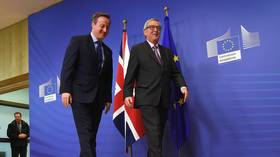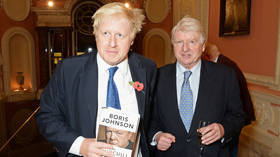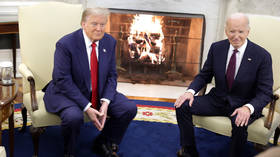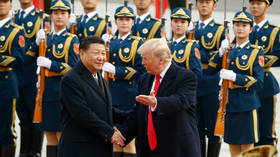You may loathe him, but Jean-Claude Juncker is right…he could have stopped Brexit by ignoring snake charmer David Cameron

The EU bureaucrat has revealed he was convinced not to interfere in the referendum campaign by the then-PM. This was a shocking betrayal of the democratic principle of hearing both sides of a debate in full.
Time supposedly heals all wounds, but not if your name is David Cameron. The former British prime minister was the man who led the Conservatives back into power in 2010, which they’ve held on to resoundingly until now.
Also on rt.com Second UK inquiry into ex-PM David Cameron lobbying scandal announced by select committee of MPsAt present, he’s mired in a series of investigations regarding cronyism, due to a seemingly revolving door between the corridors of power and big business.
Some senior civil servants have even been discovered to be working for both sides simultaneously. It’s a cesspit of greed, and Cameron is implicated after personal calls to the Chancellor Rishi Sunak on behalf of his employer were publicised.
But the more damaging revelations about the ex-PM have come from the man no one likes, Jean-Claude Juncker. The former European Commission president has spoken of what Cameron asked him to do in the run-up to the Brexit referendum.
Juncker said, “He told me not to interfere in the debate in the UK, not to come to London, not to do interviews with the British press… They asked me to shut up, so I shut up. That is something I criticise myself for. I should have spoken out rather than stay silent.”
In hindsight, there are many faces of Brexit. Nigel Farage is the most prominent. Among the others are current PM Boris Johnson, although he famously – and typically – lacked any moral fibre and only decided to back Leave after writing two competing newspaper columns, before picking the side that would benefit his personal obsession for power.
Standing beside BoJo on the team was Michael Gove, who is also at the heart of the British government now, plus high-profile figures like Katie Hopkins and inventor James Dyson.
But on the opposing Remain side, there were no definitive faces. No one really summed up the spirit of staying in the EU and it was Cameron who was largely responsible for that. He was strongly Remain, but the trouble was no one listened.
This was simply because he had a dog in the fight, as it was his government which was on the line. So, whatever he said, all that came across was a man campaigning to keep his job.
Those on the Leave side weren’t running for office. They realised the choice was about how voters wanted to see their future, and they cleverly used that as a way to convey their political aspirations as mere opinions.
It’s like a car mechanic saying, “Look, it doesn’t matter to me, but your alternator is going to go in six months. So, if I were you, I’d get a new one.” The choice is yours, but a seed has been planted by someone offering their viewpoint (and who has a vested interest in the outcome).
Cameron’s arrogance extended to his Leave rivals, who he considered inferior politicians. There was some merit in that. None of them has left any meaningful imprint, unlike Cameron who made the Conservatives electable again. But the Brexit debate wasn’t an election campaign; it was about listening to different views on Europe. That was a fatal error in Cameron’s strategy.
The next was telling Juncker to shut up. There’s no doubt he is a bureaucrat whose image is that of a geography teacher, but he didn’t need Britain to keep his job or prolong a career. And it seems almost patronising to state that he could convey the European Union’s position with more certainty than Cameron. How could the PM speak for 27 other nations?
It’s an abomination that Juncker was advised to stay away from the UK. He could have toured the entire country, not as a campaigner but as an informer, laying out what would happen and how the European leaders were likely to react.
In a criminal trial, both sets of lawyers are duty bound to do all they can to convict or acquit the accused. They don’t have to believe or like the person but, by giving a platform to every side of the argument, a robust trial unfolds and justice is done.
By blocking Juncker, Cameron was scuttling his own vessel as we were denied hearing a key contributor to the debate. Instead, the only voices heard were those of the prosecution.
The Brexit referendum was a one person, one vote affair conducted across the nation. Unlike British elections, there were no constituencies to focus on or write off. Every single voted mattered, and the results were extremely close, with a 52/48 split in favour of Leave.
Now Britain has left, Northern Ireland has seen a return of scenes resembling The Troubles when paramilitary groups waged civil war. Police officers have been injured, and we’ve witnessed firebombings and wanton acts of destruction.
Brexit has essentially left the province half in the UK and half in the EU. This is not the arena to untangle the Northern Ireland protocol fully, but its haphazard arrangement has been a surprise for many people in Britain. If Juncker had been allowed to lay out the potential consequences, I can’t help but think more people would have voted Remain.
The same can be said for fishermen, who were promised they’d be able to reclaim British waters but have been left up the creek without a paddle. If Juncker had turned up at their docks and told them categorically what was going to happen, it would have surely changed a few minds.
The point here is not to cry about spilt milk or lobby for a Brexit rerun. The die is cast and Britain is out of the EU. But it was a fraudulent result because of two men and their egos – Cameron for his inflated sense of importance and demand to be centre stage, and Juncker for his naivety and lack of gumption to realise that he owed the British people (who were EU citizens after all) the decency to hear his input.
I took part in the Brexit referendum and my own vote is irrelevant now, but I would change it if I could. Not because I question the logic I used to make my decision, but because I – along with millions of others – was not afforded the chance to really hear both sides. And the ultimate irony is that this was down to our prime minister, who was backing Remain.
Cameron didn’t just shoot himself in the foot, he blew it off with a torpedo. He used his much talked about charm to schmooze Juncker in the same way a cobra is hypnotised by a snake charmer.
The lesson here is not that we’re better together, or that national government is fairer and more efficient than the kind of bureaucracy offered by Brussels.
No, the real lesson is that voters have to receive full transparency. Our institutions, authorities and media must ignore any demands to be silenced. True democracy and people power is not putting an X in a box, it’s hearing every opinion beforehand. What a shame Britain was denied that opportunity by David Cameron.
If you like this story, share it with a friend!
The statements, views and opinions expressed in this column are solely those of the author and do not necessarily represent those of RT.

















